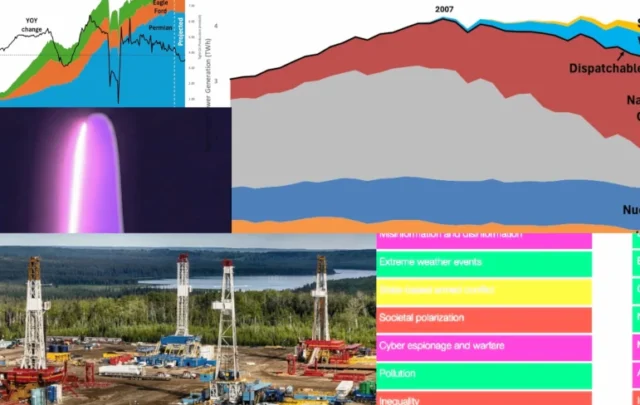Statement On Global ‘Oil Peak’
We, the members of the educational and scientific communities involved in the study of the worldwide peak of oil production, offer the following statement on the problem and its implications for our future:
Oil is a finite resource.
Oil was formed in the geological past, and a growing number of the world’s leading petroleum geologists agree that more than 95 percent of all recoverable oil has now been found. We therefore know, within a reasonable degree of certainty, the total amount of oil available to us. As of this statement, we have consumed approximately half of the recoverable oil, and we continue to consume about 75 million barrels per day. Since 1981 we have consumed oil faster than we have found it, and the gap between our growing consumption and shrinking discovery continues to widen. Oil is now being consumed four times faster than it is being discovered, and the situation is becoming critical. Oil is our most important energy source.
Oil is the fuel that enabled the growth of modern civilization, and all industrialized countries now rely on it to an extraordinary extent. Oil provides 40 percent of all primary energy, and 90 percent of our transportation energy. It is furthermore critical to industrial agriculture, the chemical and pharmaceutical industries, much of the clothing industry, and a vast array of others. The physical and chemical versatility of oil, combined with its high energy density, are such that no other known energy source can serve as a full or even adequate substitute. In short, oil is the lifeblood of the industrial world.
Worldwide oil production is peaking.
After more than fifty years of research and analysis on the subject, it is now clear that the rate at which world oil producers can extract oil has reached, or is extremely close to reaching, the maximum level possible. This is what is meant by ‘oil peak.’ With great effort and expenditure, the current level of oil production can possibly be maintained for a few more years, but beyond that oil production must begin an irrevocable decline. This decline is a certainty, guaranteed by the natural laws that govern our physical world, and nothing in science, technology, or engineering can prevent it. The consumption of a finite resource is simply a finite endeavor, and attempting to delay the onset of decline only ensures a steeper, more uncontrollable decline.
Oil peak is a powerful force of global destabilization.
The foreshocks of the impending oil production peak are already impacting our economies, our environment, and our geopolitics. The inexorable tightening of supply is destabilizing oil markets, which now exhibit extreme price responses to the smallest of disturbances. Higher oil prices are hurting economies by increasing the cost of consumer goods while simultaneously reducing spendable income. Efforts to shore up weakened economies through relaxed environmental regulations, drilling in increasingly sensitive wildlife areas, or shifting to coal and nuclear technologies, are heightening environmental concerns. And with more than fifty oil-producing countries now in decline, focus on the oil-rich Middle East has sharpened dramatically. Countries of the Middle East have traditionally been able to relieve tight oil markets by increasing production, but, as the Middle East nears its own oil peak, any relief it can provide is limited and temporary. Nonetheless, many countries have become heavily reliant on Middle Eastern oil, and the geopolitical stakes of conflicts in this region have risen to all-time highs. Solutions must be grounded in science.
The laws of thermodynamics and physics, as opposed to business and economics, must guide us through this crisis. Open markets are not equipped to cope with depletion of a critical resource, as they cannot foresee the serious technical limitations of various replacement technologies. Natural gas, for example, is itself a finite resource, and is already in decline in North America. Hydrogen is a commonly cited panacea, but rather than being a primary energy source, hydrogen is only an energy carrier – much like a battery. As such, hydrogen is strictly an energy loser. Replacing oil with a sevenfold increase in nuclear energy, would pose a serious and expensive waste problem. Renewable energies including solar, wind, geothermal, and biomass must be encouraged, and their potential for large-scale deployment must be assessed. Other technologies still in the laboratory, either proven or as yet unproven, may be extremely difficult to deploy in the timeframe and scale dictated by this problem.
We call on all governments of the world to address this issue very seriously.
Oil peak is an inevitability. The first warnings were made public nearly half a century ago, and increasingly since that time the community of petroleum geologists has expressed concerns about global oil supplies. Since 1995, a group of veteran geologists has been issuing highly specific warnings based on exhaustive analyses. We now ask that the call be heard. A first response must include decisive cuts in consumption, and a thorough reassessment of the size of the world’s oilfields. Communities everywhere must be apprised of this issue so that they may take part in creating a sustainable future. Oil peak is the most pivotal challenge facing modern civilization. It is time to come together and acknowledge our collective vulnerability, and begin working to change the structure of our culture and civilization in ways we’ve never attempted before. We do not underestimate the magnitude of the task, nor the consequences of a failure to act. Please join us in adopting this statement, and become part of a growing community working to respond at every level.
Saturday, 22nd March 2003























